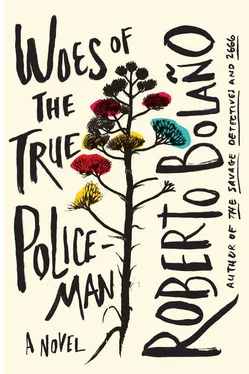Horacio Guerra, professor of literature and official historian of Santa Teresa, distinguished polymath according to some friends from Mexico City, where he went every four months to soak up ideas , was, like Amalfitano, fifty years old, though unlike the latter he was beginning to enjoy a certain reputation — earned, God only knew, by the sweat of his own brow.
Born of humble stock, he had worked stubbornly his whole life to get ahead. He was awarded a scholarship by the government of Sonora, and finished his university studies at twenty-eight; he wasn’t a great student, but he was curious and, in his own way, diligent. At twenty-one he published a book of sonnets and cataphoras ( Spell of the Dawn , Tijuana, 1964) that won him the respect of some influential reviewers at northern Mexico newspapers and inclusion, six years later, in an anthology of young Mexican poets edited by a young lady from Monterrey which managed to briefly engage Octavio Paz and Efraín Huerta in a dialectical battle (both despised the anthology, though for reasons that were contradictory and mutually opposed).
In 1971 he moved to Santa Teresa and began to work at the university there. At first the contract was for only one year, during which time Horacio Guerra finished a study and anthology of the work of Orestes Gullón ( The Temple and the Wood: The Poetry of O. Gullón , with prologue and notes by J. Guerra, University of Santa Teresa, 1973), an underappreciated Oaxacan poet and old friend of the university rector. His contract was extended for another year and then for five and then indefinitely. Now his interests multiplied. It was as if he had suddenly become a Renaissance man. From the sculpture and architecture of the school of Maestro Garabito to the poetry of Sor Juana Inés de la Cruz and Ramón López Velarde, pillars of Mexicanness, he dabbled in everything, sought to learn about everything, studied everything. He wrote a treatise on the flora and fauna of the Mexican northeast, and it wasn’t long before he was named honorary president of the Santa Teresa Botanic Garden. He wrote a brief history of the city’s old town, kept up a regular column called “Memories of Our City Streets,” and finally was named official historian, a distinction that filled him with satisfaction and pride. All his life he would remember the ceremony, which was only an informal gathering but was attended by the bishop of Sonora and the state governor.
In academic circles his presence was inevitable: he might have been slow on the uptake and not particularly charming, but he made sure he was seen where he needed to be seen. The other professors were divided between those who admired him and those who feared him; it was easy to take issue with his ideas, his projects, or his teaching methods, but not advisable if one didn’t want to be excluded from university activities and social life. Though a serious man, he was up on all the gossip and secrets.
In 1977 he published a book on the Potosí school of Maestro Garabito, who left his mark on the public buildings and plazas of the north of Mexico ( Statues and Houses of the Border , University of Santa Teresa, thirty photographs and illustrations). Shortly after he was named professor, the book he considered his masterwork appeared: Ramonian Studies , on the life and work of Ramón López Velarde (University of Santa Teresa, 1979). The following year saw his book on Sor Juana Inés de la Cruz ( The Birth of Mexico , University of Santa Teresa, 1980), a work that was dedicated to the rector and that sparked a kind of polemic: accusations of plagiarism appeared in two Mexico City newspapers but the slander didn’t stick. By this point something had developed between Guerra and the rector, Pablo Negrete, that could superficially have been called friendship. They saw each other, yes, and sometimes they had a drink together, but they weren’t friends. Guerra knew he was a glorified courtier— courtier , the term wounded and pleased him, filled him with pride and gloom, but it was the only one that fit the facts — and yet he believed that he, too, when the moment came, would be university president and that he would take under his wing another professor in circumstances similar to his own. For years now, too, he suspected that Pablo Negrete had been delegating to him only practical matters, resolving worldly matters without his counsel.
He lived in a permanent state of agitation.
At the time when Amalfitano met him, Horacio Guerra was a well-dressed man (this was a quality — like so many others — that he shared with the president, who over the years had become a dandy) among poorly or sloppily dressed professors and students. His manner was cordial, though he sometimes raised his voice excessively. His gestures for years now had tended to be peremptory. It was said that he was ill, but no one knew what was wrong with him. It was probably something do to with his nerves. He never missed a class. He lived in a fifteen-hundred-square-foot apartment in the center of Santa Teresa. He was still a bachelor. For a while now his students had been calling him by the nicer-sounding and more peaceable name of Horacio Tregua, Truce replacing War .
After Amalfitano had sent out fifty job applications and pestered the few friends he had left, the only school to show an interest in his services was the University of Santa Teresa. For a full week Amalfitano debated whether to accept the job or to wait by the mailbox for a better offer. In terms of quality, the only worse options were a Guatemalan university and a Honduran one, though neither had even bothered to send him a written rejection. In fact, the only universities that had gotten back to him to say no were the European ones with which Amalfitano had had previous dealings. All that was left was the University of Santa Teresa, and after a week of thinking it over, sunk in a deepening depression, Amalfitano sent word that he would accept the position. He soon received a copy of the contract, all the papers and forms he would need to fill out for his work permit, and the date when he was expected in Santa Teresa.
He lied to Rosa. He told her that his job was ending and that they had to leave. Rosa thought they would return to Italy, but she wasn’t unhappy to hear that they were going to Mexico.
At night Amalfitano and his daughter talked about the trip. They made plans, studied maps of northern Mexico and the southern United States, decided which places they would visit on their first vacations, what kind of car they would buy (a used one, like in the movies, at one of those lots with a salesman in a blue suit, red tie, and snakeskin boots), the house they would rent, no more apartments, a little house with two or three bedrooms, a front yard, and a backyard where they could barbecue, though neither Amalfitano nor his daughter was entirely sure what barbecuing was: Rosa claimed it involved a grill set up in the backyard (next to the pool, if possible) where meat and even fish were grilled; Amalfitano thought that in Mexico it actually involved a pit — a pit out in the country, ideally — into which one shoveled hot coals, then a layer of earth, then slabs of goat, then another layer of earth, and finally more hot coals; the pieces of meat, according to Amalfitano, were wrapped in the leaves of some ancient tree, the name of which escaped him. Or in aluminum foil.
Those last days in Barcelona, Amalfitano sat at his desk for hours, supposedly working but really doing nothing. He thought about Padilla, his daughter, his dead wife, random scenes from his youth and childhood. Rosa, meanwhile, was never at home, as if the moment she had to leave Barcelona she was seized by an irresistible urge to walk its streets, to see and commit to memory every inch of it. Usually she went out alone, although occasionally she was accompanied by Jordi Carrera, silent and distant. Amalfitano would hear him arrive, and after a brief interval in which nothing seemed to happen, he would hear them go and it was then that he most regretted having to leave Barcelona. Then he would stay up, though with the lights off, until one or two or three in the morning, which was when Rosa generally came home.
Читать дальше








![О Генри - Бляха полицейского О’Руна [The Badge of Policeman O'Roon]](/books/405347/o-genri-blyaha-policejskogo-o-runa-the-badge-of-po-thumb.webp)



